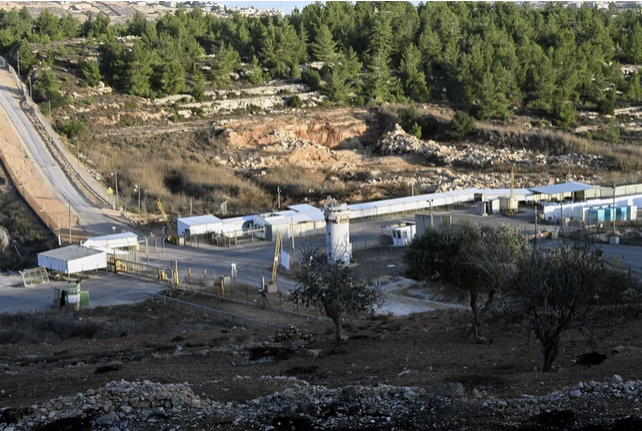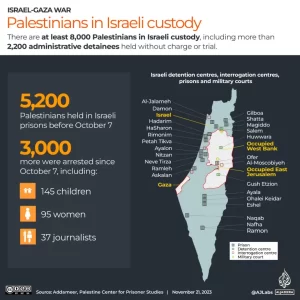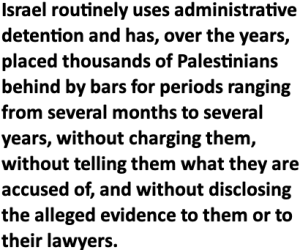Palestinian prisoners in Israeli gaols: an explainer

JVL Introduction
Al Jazeera has published this very helpful explainer on the Palestinian prisoners who are being exchanged and on Palestinian prisoners in general.
Were you aware that over 3,000 Palestinians have been arrested on the West Bank since October 7?
Or that common offences for being gaoled are “threatening security” and “throwing stones”.
Or that trials, when they are held (at present over a quarter of prisoners are held without charge or trial) are under Israeli military law.
Al Jazeera’s up-to-the minute article is complemented by B’Tselem’s background information post, also reproduced below.
It is clear that very many prisoners are in effect hostages under another name.
RK
This article was originally published by Al Jazeera on Fri 24 Nov 2023. Read the original here.
Who are the Palestinian prisoners Israel released on Friday?
After seven weeks of war, the four-day truce between Israel and Hamas began on Friday morning. Under this truce, 39 Palestinian women and children were released on Friday.
Here is what’s known about those released and those who might be released in the coming days.
Of the 39 Palestinians released by Israel, 17 are minors.
They are:
- Yousef Mohammad Mustafa Ata from Ramallah
- Qusai Hani Ali Ahmad from Bethlehem
- Jibreel Ghassan Ismail Jibreel from Qalqilya
- Mohammad Ahmad Suleiman Abu Rajab from al-Khalil
- Ahmad Nu’man Ahmad Abu Na’im from Ramallah
- Baraa Bilal Mahmoud Rabee from al-Khalil
- Aban Iyad Mohammad Said Hammad from Qalqilya
- Moataz Hatem Moussa Abu Aram from al-Khalil
- Iyad Abdul Qader Mohammad Khateeb from Jerusalem
- Hazma Laith Khalil Othman Othman from Ramallah
- Mohammad Mahmoud Ayoub Dar Darwish from Ramallah
- Jamal Khalil Jamal Barahmeh from Areeha
- Jamal Yousef Jamal Abu Hamdan from Nablus
- Mohammad Anis Saleem Tarabi from Nablus
- Abdul Rahman Abdul Rahman Suleiman Rizq from Jerusalem
- Zeina Raed Abdou from Jerusalem
- Noor Mohammad Hafez al-Tahir from Nablus
Zeina and Noor are girls, the others are boys.
The remaining 22 of the Palestinians released on Friday are women. They are:
- Rawan Nafez Mohammad Abu Matar from Ramallah
- Marah Joudat Moussa Bakeer from Jerusalem
- Malak Mohammad Yousef Suleiman from Jerusalem
- Amani Khaled Nu’man Hasheem from Jerusalem
- Nihaya Khader Hussein Sawan from Jerusalem
- Fayrouz Fayez Mahmoud al-Baw from Jerusalem
- Tahreer Adnan Mohammad Abu Suriya from Nablus
- Falasteen Fareed Abdul Latif Najm from Nablus
- Walaa Khaled Fawzi Tanja from Tulkarem
- Maryam Khaled Abdul Majid Arafat from Nablus
- Asil Muneer Ibrahim al-Tayti from Nablus
- Azhar Thaer Bakr Assaf from Jerusalem
- Raghd Nashat Salah al-Fanni from Tulkarem
- Fatima Nu’man Ali Badr from Jerusalem
- Rawda Moussa Abdul Qader Abu Ujaima from Bethlehem
- Sara Ayman Abdul Aziz Abdullah al-Suweisa from Nablus
- Fatima Ismail Abdul Rahman Shahin from Bethlehem
- Samira Abdul Harbawi from Jerusalem
- Samah Bilal Abdul Rahman Souf from Qalqilya
- Fatima Bakr Moussa Abu Shalal from Nablus
- Hanan Saleh Abdullah al-Barghouthi from Ramallah
- Fatima Nasr Mohammad Amarnah from Jenin
When and how were they released?
They were transferred from Israeli prisons to the Israel-controlled Ofer prison in the occupied West Bank in the early evening.
At 8pm local time (18:00 GMT), they were released from Ofer in International Committee of the Red Cross buses.
Who might be released next?
Israel has agreed to release 150 Palestinian women and children prisoners from its jails in exchange for Hamas releasing 50 of the women and children taken captive during the October 7 attack.
But the Israeli Ministry of Justice presented a list of 300 Palestinian prisoners who it is considering for release. It is unclear whether this might be an offer for a potential second phase of exchanges since the deal allows for the extension of a pause in fighting by one day for every 10 additional captives Hamas releases.
The list of 300 comprises 33 women. The majority of the rest of the names are of boys aged 16-18. However, there are also boys as young as 14 on the list.
Most of the prisoners on the list were arrested between 2021 and 2023. The prisoners arrested in 2023 were taken before October 7.
However, it also includes individuals like Shorouq Dwayyat, who was arrested in 2015 and is serving the ninth year of her 16-year sentence. Dwayyat is currently serving the longest sentence among Palestinian female prisoners in Israeli jails.
She was 18 when she was arrested and held in the Damon prison in Haifa, accused of stabbing an Israeli settler with a knife. Her family, anxiously anticipating her release, denies these accusations. “Shorouq is delicate and cannot harm an animal,” her father, Salah Dwayyat, told Al Jazeera at the time.
Why are they in prison?
Like Dwayyat, many other prisoners have been convicted of crimes including carrying and manufacturing knives and daggers. Other common offences detailed in Israel’s list include:
- threatening security
- illegally entering Israel without a permit
- throwing stones
- supporting terrorism
- associating with hostile/unknown organisations.
“The main alleged crime for these detentions is stone-throwing, which can carry a 20-year sentence in prison for Palestinian children,” said a report published in July by children’s rights organisation, Save the Children.
Israeli publication Haaretz reported that Israel has refused to release people convicted of murder but those convicted of attempted murder could be released.
Where will the Palestinian prisoners go after their release?
Under the deal, Palestinian prisoners will be taken from two Israeli prisons southeast of Haifa, namely Damon and Megiddo. They will then be taken to Israel’s military Ofer prison.
There, they will be handed over to the International Committee of the Red Cross and after they are received, “the ones from Jerusalem will go to Jerusalem, and the ones from the West Bank will gather in Betunia municipal council where their families will be waiting”, added Fares.
Israel has barred celebrations in Palestinian communities over the return of prisoners.
How many Palestinian prisoners are in Israeli jails?
There are 19 prisons within Israel and one inside the occupied West Bank holding Palestinian prisoners.
Before October 7, there were about 5,200 Palestinians in Israeli custody. However, following the Hamas attack of October 7, the number of Palestinians arrested skyrocketed and 3,000 more were arrested.
 (Al Jazeera)
(Al Jazeera)
Of those arrested after October 7, 37 are journalists. Palestinian prisoner support and human rights association Addameer reported that most of these journalists were subjected to administrative detention, which means they are held indefinitely behind bars without facing trial or charges.
Addameer also reported that the detainees are subjected to physical violence and medical negligence in prisons. The report cited an example of a prisoner who suffers from blood disease and asthma. The prisoner was assaulted, resulting in wounds and bruises on his head and eyes. The association reported that this prisoner has lost 10kg since his arrest.
Some Palestinian prisoners have been in Israeli jails for more than 30 years, since before the Oslo Accords were signed. The term “deans of prisoners” is sometimes locally used to refer to them, reported Samidoun, an international Palestinian prisoner solidarity network.
At least 700 Palestinian children under the age of 18 from the occupied West Bank are prosecuted every year through Israeli military courts after being arrested, interrogated and detained by the Israeli army.
Children in Israeli detention often suffer physical, psychological and sexual abuse, and some are deprived of food, water and sleep, according to Save the Children.
Administrative detention
B’Tselem
In administrative detention, a person is held without trial without having committed an offense, on the grounds that he or she plans to break the law in the future. As this measure is supposed to be preventive, it has no time limit. The person is detained without legal proceedings, by order of the regional military commander, based on classified evidence that is not revealed to them. This leaves the detainees helpless – facing unknown allegations with no way to disprove them, not knowing when they will be released, and without being charged, tried or convicted.

In the West Bank (not including East Jerusalem), administrative detention is carried out under the Order regarding Security Provisions. The order empowers the military commander of the West Bank, or another commander to whom the power has been delegated, to place individuals in administrative detention for up to six months at a time, if the commander has “reasonable grounds to believe that reasons of regional security or public security require that a certain person be held in detention”. If, prior to the expiration of the order, the military commander has “reasonable grounds to believe” that the same reasons “still require the retention of the detainee in detention”, he may extend the original order for an additional six-month period “from time to time”. The Order regarding Security Provisions places no limit on the overall time that a person can be held in administrative detention, so the detention can be extended over and over. In practice, this allows Israel to incarcerate Palestinians who have not been convicted of anything for years on end.
Individuals held in administrative detention must be brought before a military judge within eight days – either of the original detention order or of its extension. The judge may uphold the order, reject it, or shorten the period of detention stipulated in it. Whatever decision the military judge makes, both the detainee and the military commander may appeal it to the Military Court of Appeals, and thereafter, to the High Court of Justice (HCJ). Hearings on administrative detention orders are held in camera, and the judges are permitted to set aside ordinary evidence law. In particular, judges may “accept evidence in the absence of the detainee or their counsel and without disclosing it to them”, if they are convinced that disclosing the evidence may “harm regional security or public security”.
Administrative detention of Israeli citizens and residents is carried out under the Emergency Powers (Detentions) Law. Over the years, Israel has used this measure against several Israeli citizens, including settlers. These are isolated cases, and in most of them, the detention lasted a few months. Since Israel “disengaged” from the Gaza Strip in September 2005, it has used the Internment of Unlawful Combatants Law to place Gaza residents under administrative detention. This measure has so far been used in very few cases. The provisions of both these laws are similar in essence to those of the military order that applies in the West Bank.
The Order regarding Security Provisions includes provisions that are ostensibly meant to protect administrative detainees, in keeping with the tenets of international law on this matter, which allow the occupying power to place residents of the occupied territory under administrative detention only in rare, exceptional circumstances. This has not stopped Israel from making extensive use of this measure in the Occupied Territories. Israel routinely uses administrative detention and has, over the years, placed thousands of Palestinians behind by bars for periods ranging from several months to several years, without charging them, without telling them what they are accused of, and without disclosing the alleged evidence to them or to their lawyers. Some of the detainees were under 18 years of age.
During the first and second intifadas, Israel held many hundreds of Palestinians in administrative detention, and the figure crossed the 1,000 mark several times in 2003 (during the second intifada). Yet the widespread use of this extreme measure is not confined to those periods: Since March 2002, not a single month has gone by without Israel holding at least 100 Palestinians in administrative detention.
Moreover, in some cases, the authorities use administrative detention as a quick and easy alternative to criminal trial, rather than to prevent future danger. This occurs primarily when they do not have sufficient evidence for indictment, or when they do not want to reveal the evidence they allegedly possess. This use of administrative detention is absolutely prohibited and totally blurs the distinction between an administrative proceeding that is intended as a prospective, preventive measure, and a criminal proceeding, whose purpose is punitive and retroactive. Israel also exploits this measure to detain Palestinians for their political opinions and for engaging in non-violent political activity.
In addition, the restriction in the Order regarding Security Provisions on the duration of administrative detention is meaningless, as the detention may be extended over and over with no time limit. Such extensions are not rare. At the end of May 2017, for instance, 475 Palestinians were being held under administrative detention in Israel Prison Service facilities. Of these, 128 had been held for six to twelve months, meaning their detention had been extended at least once, and 121 had been held for more than a year, meaning their detention had been extended at least twice.
The military order does require that detainees be brought before a judge, but this does little to prevent abuse of this measure, and the judicial proceedings on administrative detention are mostly a façade of judicial review. In the vast majority of cases, the judges accept the prosecution’s position and approve the detention order.
According to figures provided by the IDF Spokesperson, from the beginning of 2015 to the end of July 2017, 3,909 administrative detention orders were issued. Of these, 2,441 (62.4%) were extensions of existing orders. Only 48 (1.2%) were cancelled by a military court. The remaining detention orders were approved, as follows:
- 2,953 (75.5%) were approved with no amendments or limitations.
- In 390 cases (9.9%), the judges instructed that the orders be shortened, yet placed no limitation on the possibility of renewing them.
- In 501 (12.8%) cases, the judges approved the orders, in some cases shortening them, but stipulated that they could only be extended if new information came to light – which, again, would not be disclosed to the detainee.
(Note: The discrepancy between the total number of orders and the number of court decisions appears in the original. Moreover, despite our request, the IDF Spokesperson did not provide B’Tselem with figures concerning the Military Court of Appeals).
Moreover, the judges always accept the prosecution’s demand that the evidence remain confidential for “reasons of national security”. By following this practice, the judges turn the exception provided for in the administrative detention order into a rule that denies detainees any possibility of mounting a defense against the allegations. The secrecy of the evidence prevents detainees and their counsel from examining the quality, veracity and relevance of the information used against them. True, the military judges and the HCJ justices have stated that, given the confidentiality, they must fill the void and act as defense for the detainees. However, this statement is not followed up in practice. In the overwhelming majority of cases, the judges do not ask to see the ISA’s information, do not examine the military prosecution regarding the information that led to the detention, and simply accept the arguments presented to them as fact.
Moreover, in their judgments on administrative detention, the justices of the HCJ have agreed that this is an “extreme” measure that must be used carefully and in rare exceptions only. They agreed it must be used only for prevention and never for punitive purposes, and only when the danger is posed specifically by the person under detention. They also agreed that administrative detention, like all other measures, is subject to the principle of proportionality and therefore must be used only when the alleged danger cannot be prevented through criminal proceedings or an administrative measure that is less injurious to human rights. Nonetheless, the justices have upheld nearly all the administrative detention orders brought before them.
The power to incarcerate people who have not been convicted or even charged with anything for lengthy periods of time, based on secret “evidence” that they cannot challenge, is an extreme power. Israel uses it continuously and extensively, routinely holding hundreds of Palestinians at any given moment. The state makes sure to lend this policy a guise of legality by requiring the courts to review every detention order. In these proceedings, the detainees are represented by counsel; they may appeal the judge’s decision, and the hearings follow procedural and evidentiary rules. However, this is merely a façade of judicial review, as the detainees have no real opportunity to mount a reasonable defense against the allegations. Nevertheless, the courts routinely uphold the detention orders. At the end of the day, the military, the Military Advocate General’s Corps and the State Attorney’s Office, military judges and the justices of the HCJ Court are all complicit in creating this state of affairs.

It’s tantamount to a military dictatorship….. for the Palestinians, that is.
I assume Starmer is well aware of all this. And MPs in general. And Biden et al, and the EU and MEPs, and politicians all around the world. But I’m particularly thinking of all those who give their unreserved support to Israel.
I can only imagine that most people would be horrified and appalled if they were aware aware of all of this.
Some Democracy!
Those detained under administrative detention laws are perhaps lucky….so many Palestinian activists have been murdered by IDF/ Mossad
Israeli authorities and military are sick. Beyond redemption.
Helpful. Note though; whether ‘administrative detention’ is allowed by international law at all seems unclear?
Shocking information, of course, but without any reference to it by the one=sided British main news media.